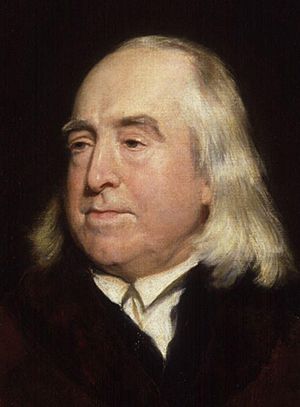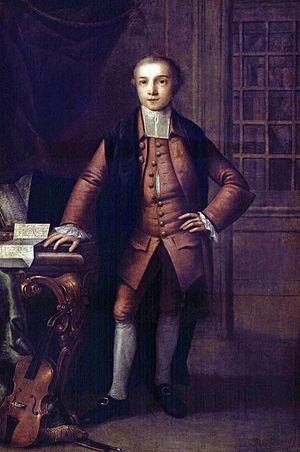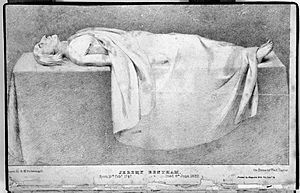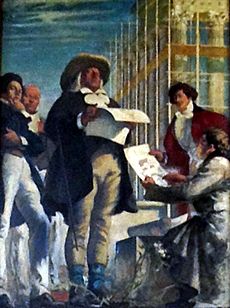Jeremy Bentham facts for kids
Quick facts for kids
Jeremy Bentham
|
|
|---|---|

Portrait by Henry William Pickersgill
|
|
| Born | 15 February 1748 [O.S. 4 February 1747/8] |
| Died | 6 June 1832 (aged 84) London, England, United Kingdom
|
| Education | The Queen's College, Oxford (MA) |
| Era |
|
| Region | Western philosophy |
| School | Utilitarianism Legal positivism Liberalism Radicalism Epicureanism |
|
Main interests
|
Political philosophy, philosophy of law, ethics, economics |
|
Notable ideas
|
Principle of utility Felicific calculus |
|
Influenced
|
|
| Signature | |
 |
|
Jeremy Bentham (/ˈbɛnθəm/; 15 February 1748 – 6 June 1832) was an English philosopher, law expert, and social reformer. He is known as the founder of modern utilitarianism.
Bentham believed that the best way to decide what is right or wrong is to find what creates "the greatest happiness for the greatest number." He became an important thinker in philosophy of law. He also influenced the idea of welfarism, which means that the government should help its citizens.
He supported many freedoms, like individual and economic freedom. He also believed in the separation of church and state and freedom of expression. Bentham argued for equal rights for women and the right to divorce. He called for ending slavery, capital punishment, and cruel physical punishments. He was also an early supporter of animal rights. While he wanted more legal rights for people, he disagreed with the idea of "natural rights." He called these "nonsense upon stilts" because he didn't believe they came from a divine source.
Bentham taught many students, including James Mill and his son, John Stuart Mill. He greatly influenced how prisons, schools, laws, and even Parliament were reformed.
When Bentham died in 1832, he asked for his body to be preserved as an "auto-icon." This "self-image" would be his memorial. You can see it today at University College London (UCL). Because he believed in making education available to everyone, he is called the "spiritual founder" of UCL.
Contents
About Jeremy Bentham
Early Life and Education

Jeremy Bentham was born in London on 15 February 1748. His father was a lawyer. Jeremy was a very smart child. He was reading a history book at a very young age and started learning Latin at three. He also learned to play the violin.
At age 12, he went to The Queen's College, Oxford. He earned his first degree in 1764 and a master's degree in 1767. He trained to be a lawyer but never actually practiced law. He found English law very confusing and called it the "Demon of Chicane."
The Panopticon Prison Idea
In the 1780s, Bentham visited his brother Samuel in Russia. Samuel had an idea for a circular building. This design would allow a few managers to watch many workers easily.
Bentham took this idea and developed it for prisons. He called his design the Panopticon. It was meant to be cheaper than other prisons because it needed fewer staff. Prisoners would also work, which would help pay for the prison. The main idea was that prisoners would always feel watched, even if no one was there.
Bentham spent about 16 years working on his Panopticon plans. He hoped the government would build it and let him manage it. However, the prison was never built in England. He felt very upset about this. Even though it wasn't built, the Panopticon idea influenced many thinkers later on.
Bentham eventually received money from the government for his efforts. He also worked with Patrick Colquhoun to fight corruption in London's port. This led to the creation of the Thames River Police. This was the first police force focused on preventing crime in the country.
Important Connections
Bentham wrote letters to many important people. He talked with Adam Smith about economic ideas. He was even made an honorary citizen of France because of his discussions with leaders of the French Revolution. However, he disagreed with the violence that happened during the revolution. He also became friends with Latin American revolutionary Francisco de Miranda.
In 1823, Bentham helped start The Westminster Review. This was a magazine for a group called the "Philosophical Radicals." These were younger thinkers who were influenced by Bentham. Through them, Bentham had a big impact on British public life. Two important people he worked with were John Bowring and Edwin Chadwick.
Personal Life
Bentham never got married. He was an atheist, meaning he did not believe in God.
He had a strict daily routine. He would wake up at 6 am, walk for two hours, and then work until 4 pm.
His Legacy
Today, the Faculty of Laws at University College London is in a building called Bentham House. His ideas also inspired a company that helps fund lawsuits, which is named Bentham IMF Limited.
Jeremy Bentham's Ideas
Utilitarianism: The Greatest Happiness
Jeremy Bentham is known as the "Father of Utilitarianism." He wanted to create a complete set of laws based on this idea, which he called a "Pannomion." His main idea was that "it is the greatest happiness of the greatest number that is the measure of right and wrong." This means that the best action or law is the one that brings the most happiness to the most people.
Bentham believed that "happiness" meant having more "pleasure" than "pain." He thought that people are naturally driven by pleasure and pain. He also believed that religion should not be part of government or law.
The Principle of Utility
The principle of utility is the main idea behind all of Bentham's thoughts. He defined "good" as anything that creates the most pleasure and the least pain. "Evil" was anything that caused the most pain without pleasure. This includes both physical and mental pleasure and pain.
Bentham suggested a way to measure how much pleasure or pain an action would create. He called this the felicific calculus. It looked at things like:
- Intensity: How strong is the pleasure or pain?
- Duration: How long will it last?
- Certainty: How likely is it to happen?
- Proximity: How soon will it happen?
- Productiveness: Will it lead to more pleasures or pains?
- Purity: How free is it from opposite feelings?
- Extent: How many people will it affect?
He used these ideas to think about punishment. He argued that laws and punishments should only be used if they create more good than harm for society. He believed that lawmakers should always aim to create the greatest good for the greatest number of people.
Criticisms of Utilitarianism
Bentham's student, John Stuart Mill, later changed and added to utilitarianism. Mill thought Bentham didn't fully understand human conscience. Some critics also said that Bentham's ideas didn't focus enough on fairness or justice.
Economics
Bentham had unique ideas about money and the economy. He believed that increasing the amount of money in circulation could help create full employment. This means making sure everyone who wants a job can find one. His ideas are seen as an early step towards modern welfare economics, which studies how to improve well-being in society.
He thought that pleasures and pains could be ranked. This idea of finding the best possible outcome for pleasure and pain influenced later economic thinking.
Law Reform
Bentham was a strong supporter of making all common law into a clear set of written rules, or a "code." He even invented the word "to codify." He tried hard to get England and the United States to create these law codes. He even offered to write a complete legal code for the young United States.
During his lifetime, his efforts to codify laws were not successful. However, his writings helped set the stage for later work on legal codes in the United States.
Animal Rights
Bentham is considered one of the first people to argue for animal rights. He believed that the ability to suffer, not the ability to reason, should decide who deserves rights. He pointed out that if reason was the only measure, then human babies or people with certain disabilities might not have rights either.
He agreed that animals could be killed for food or to protect human life. But he insisted that animals should not suffer unnecessarily. He also didn't object to medical experiments on animals if they had a clear benefit for humans. However, he strongly opposed causing animals pain without a good reason.
Imperialism
From the 1790s onwards, Bentham spoke out against imperialism. He criticized countries like France for having colonies. He argued that empires were bad for both the home country and the colonies. He believed that empires were too expensive, led to higher taxes for the poor, and caused unnecessary military growth. He thought they were driven by misguided ideas of honor and glory.
Privacy
Bentham believed that transparency was very important. He thought that journalism, for example, could help keep powerful people honest. But he also wanted everyone to be transparent. He imagined a world where everyone's actions that affected general happiness would be noticed. He saw both watching others and being open as ways to improve people's lives.
Death and the Auto-Icon
Jeremy Bentham died on 6 June 1832, when he was 84 years old. He kept writing almost until his death. He carefully planned for his body to be preserved as an "auto-icon."
His auto-icon is on public display at the main entrance of the UCL Student Centre. It was moved there in 2020.
Connection to University College London
Bentham is strongly linked to the founding of London University in 1826, which later became University College London (UCL). He was 78 when the university opened, so he played an indirect role. He bought a small share in the new university, but his main influence came from his ideas.
Bentham strongly believed that education should be available to more people. In his time, only wealthy students who belonged to the Church of England could go to Oxford or Cambridge. UCL was the first university in England to accept students regardless of their background or beliefs. This matched Bentham's vision.
UCL now calls Bentham its "spiritual founder." This means his ideas inspired the university, even if he wasn't directly involved in its day-to-day creation. Since 1959, UCL has also been home to the Bentham Project, which publishes his writings.
See also
 In Spanish: Jeremy Bentham para niños
In Spanish: Jeremy Bentham para niños
- List of animal rights advocates
- List of civil rights leaders
- List of liberal theorists
- Philosophy of happiness
- Rule according to higher law
- Rule of law
 | Georgia Louise Harris Brown |
 | Julian Abele |
 | Norma Merrick Sklarek |
 | William Sidney Pittman |



